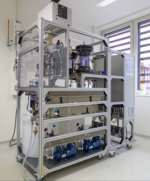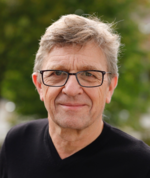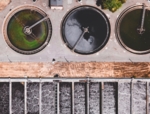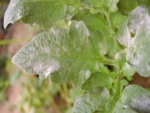Environmental analytics
Nature provides the material basis for a bioeconomy. Preventive and production-integrated environmental protection will therefore become even more important in a bioeconomy. Powerful analytical systems that can be used in industrial processes or in the field will provide information about soil, air and water quality. Environmental analytics and monitoring are crucial for the bioeconomy.
-
Climate-friendly circular economy - 11/11/2021

A Fraunhofer team has successfully produced a dye using CO2 adsorbed from the air. The aim is to move towards a climate- and resource-friendly circular economy. Chemicals, as well as fuels, can be produced cost-effectively using this process. How does the technical process work, and what opportunities does it open up?
-
Natural substance with herbicide potential - 10/12/2020

The sugar 7-deoxy-sedoheptulose (7dSh) is produced by cyanobacteria and inhibits the same metabolic pathway as the broad-spectrum herbicide glyphosate, thus making it an excellent herbicide candidate. Despite this amazing similarity, the microbiologist who discovered 7dSh, Prof. Dr. Karl Forchhammer, believes that this sugar has clear ecological advantages over glyphosate.
-
Phosphorus recovery from sewage sludge - 21/10/2020

Biotechnology for the bioeconomy: in something known as the P-bac process, sulphur bacteria extract phosphorus from sewage sludge ash. Phosphorus is one of the key building blocks of life and an essential nutrient for plant growth. When there is not enough phosphorus in the soil, farmers apply it via organic or mineral fertilisers.
-
CRISPR/Cas9 and genetic engineering laws - 27/11/2019

Plant geneticists from Tübingen have used genome deletion to breed a variety of tomato that is resistant to powdery mildew. The CRISPR/Cas9 technology that they used enabled them to achieve this in a relatively short period of time. They also demonstrated beyond any doubt that the new tomato variety contains no foreign DNA and is indistinguishable from naturally occurring deletion mutants.
Website address: https://www.biooekonomie-bw.de/en/articles/environmental-analytics


